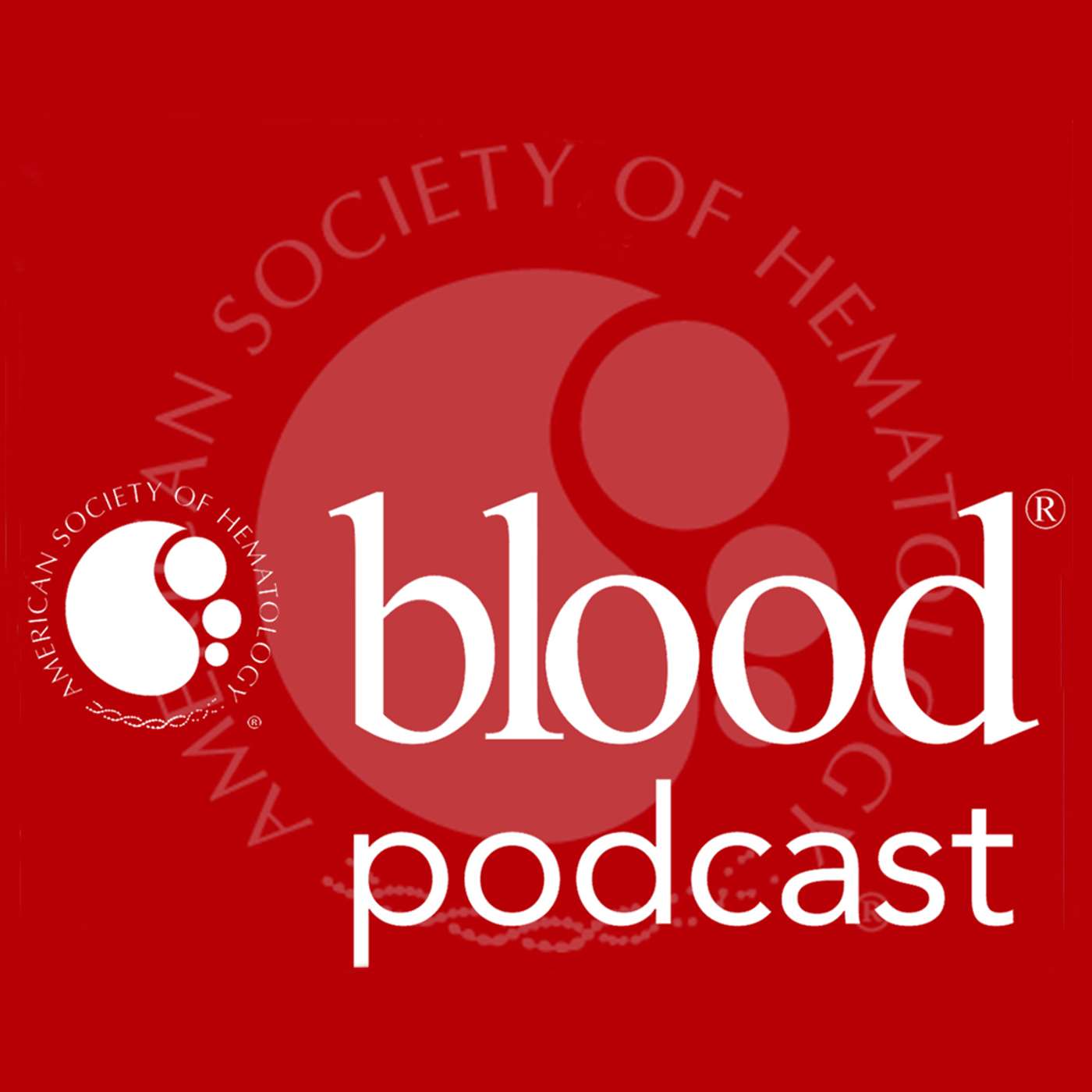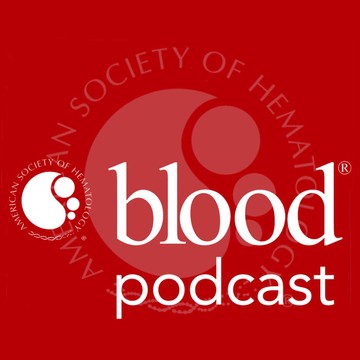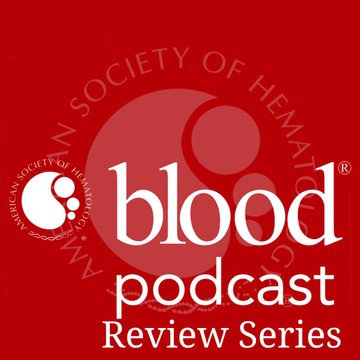

Blood Podcast
American Society of Hematology
The Blood Podcast summarizes content recently published in Blood, the most cited peer-reviewed publication in the field of hematology.
Episodes
Mentioned books

Oct 3, 2024 • 19min
A novel tripartite fusion drives treatment resistance in atypical APL; managing iTTP without TPE; hope for motherhood after allogeneic HCT
In this week's episode we’ll discuss a novel tripartite fusion drives treatment resistance in acute promyelocytic leukemia. In some patients with atypical APL, these novel retinoic acid receptor gene fusions result in truncation of the ligand binding domain of the retinoic acid receptor protein, resulting in non-responsiveness to treatment with all-trans retinoic acid. After that: managing immune thrombotic thrombocytopenia or iTTP without therapeutic plasma exchange, or TPE. Finally, hope for motherhood after allogeneic HCT.Featured Articles: Critical role of tripartite fusion and LBD truncation in certain RARA- and all RARG-related atypical APLManagement of immune thrombotic thrombocytopenic purpura without therapeutic plasma exchangeHope for motherhood: pregnancy after allogeneic hematopoietic cell transplantation (a national multicenter study)

Sep 26, 2024 • 23min
Pirtobrutinib plus venetoclax with or without rituximab in relapsed/refractory CLL; murine models of erythroid 5ALA synthesis disorders; targeting PKCa in diabetes and hemochromatosis
In this week's episode we’ll discuss the safety and efficacy of pirtobrutinib with or without rituximab in relapsed/refractory CLL; learn more about erythroid 5ALA synthesis disorders and their conditional synthetic lethal dependency on pyridoxine; and discuss how targeting PKC alpha alleviates iron overload in diabetes and hemochromatosis through the inhibition of ferroportin.Featured Articles:Fixed-duration pirtobrutinib plus venetoclax with or without rituximab in relapsed/refractory CLL: Phase 1b BRUIN trialMurine models of erythroid 5ALA synthesis disorders and their conditional synthetic lethal dependency on pyridoxineTargeting PKCα alleviates iron overload in diabetes and hemochromatosis through the inhibition of ferroportin

Sep 19, 2024 • 19min
Transplant outcomes in pediatric Fanconi anemia; hepatic Foxo1 regulates iron homeostasis; clinical networks improve APL outcomes in Latin America
In this week's episode we'll discuss outcomes following hematopoietic stem cell transplantation in pediatric patients with Fanconi anemia. Then, we'll learn about how new research shows that the transcription factor Foxo1, commonly associated with glucose metabolism, regulates hepcidin expression and systemic iron homeostasis. Finally, in Latin America: using clinical networks to improve outcomes in patients with acute promyelocytic leukemia. After clinical networks were established, survival and relapse rates improved substantially, highlighting the effectiveness of this unique intervention strategy in low- and middle-income countries.Featured Articles: Outcomes of hematopoietic stem cell transplantation in 813 pediatric patients with Fanconi anemiaFoxo1 is an iron-responsive transcriptional factor regulating systemic iron homeostasisClinical networking results in continuous improvement of the outcome of patients with acute promyelocyticleukemia

Sep 12, 2024 • 23min
CD8+ T-cell differentiation and treatment response in AML; ATM germline pathogenic variants affect cancer outcomes in ataxia-telangiectasia; efficacy of a selective menin-KMT2A inhibitor in KMT2A- and NPM1-altered leukemias
In this week's episode we’ll discuss how CD8+ T-cell differentiation and dysfunction inform treatment response in acute myeloid leukemia; learn more about the effect of ATM germline pathogenic variants on the outcomes in children with ataxia-telangiectasia and hematological malignancies; and discuss the preclinical efficacy of a potent, selective menin-KMT2A inhibitor JNJ-75276617 in KMT2A- and NPM1-altered leukemias.Featured Articles:CD8+ T-cell differentiation and dysfunction inform treatment response in acute myeloid leukemiaATM germ line pathogenic variants affect outcomes in children with ataxia-telangiectasia and hematologicalmalignanciesPreclinical efficacy of the potent, selective menin-KMT2A inhibitor JNJ-75276617 (bleximenib) inKMT2A- and NPM1-altered leukemias

Sep 5, 2024 • 18min
TCR-T cells for post-HCT leukemia recurrence; platelets are the predominant source of procoagulant membranes in hemostasis; BR + R maintenance for MCL
In this week's episode we'll discuss HA-1-targeted T-cell receptor T-cell therapy for recurrent leukemia after hematopoietic stem cell transplantation. Next, we'll learn about how 4D intravital imaging in mice reveals the key role of platelets as a source of procoagulant membranes in hemostasis. Finally, we'll hear about modifications to a common induction and maintenance treatment for treatment-naïve mantle-cell lymphoma.Featured ArticlesHA-1–targeted T-cell receptor T-cell therapy for recurrent leukemia after hematopoietic stem celltransplantation4D intravital imaging studies identify platelets as the predominant cellular procoagulant surface in a mousehemostasis modelRandomized study of induction with bendamustine-rituximab ± bortezomib and maintenance withrituximab ± lenalidomide for MCL

Aug 29, 2024 • 59sec
Outcomes of younger patients with mantle cell lymphoma; M-protein assessment during maintenance therapy in multiple myeloma; in vivo CAR T-cell generation using lentiviral vectors
In this week's episode we’ll discuss the outcomes of younger patients with mantle cell lymphoma experiencing late relapse; learn more about mass spectrometry-based assessment of M-protein in peripheral blood during maintenance therapy in multiple myeloma and discuss in vivo CAR T-cell generation in non-human primates using lentiviral vectors.Featured Articles: Outcomes of younger patients with mantle cell lymphoma experiencing late relapse (>24 months): the LATE-POD studyMass spectrometry–based assessment of M protein in peripheral blood during maintenance therapy inmultiple myelomaIn vivo CAR T-cell generation in nonhuman primates using lentiviral vectors displaying a multidomain fusion ligand

Aug 29, 2024 • 45min
Review Series on Factor XI
Introduced by Associate Editor Dr. Thomas Ortel, this bonus episode discusses the Review Series on Factor XI, published in volume 143 issue 15 of Blood Journal. Dr. Ortel is joined by contributing authors Owen McCarty, PhD, Gili Kenet, MD, and David Gailani, MD. Review Series Articles: Introduction to a review series on factor XIBiology of factor XITargeting factor XI and factor XIa to prevent thrombosisFactor XI deficiency: phenotypic age-related considerations and clinical approach towards bleeding risk assessment

Aug 22, 2024 • 17min
Protective role of neonatal CMV infection in B-ALL; GVHD targets organoid-forming bile duct stem cells; seven-year outcomes for venetoclax-ibrutinib therapy in MCL
In this week's episode we'll learn how cytomegalovirus infection early in life depletes preleukemic cells in a mouse model of B-cell acute lymphoblastic leukemia. After that we'll discuss new research, where GVHD targets organoid-forming bile duct stem cells in a TGF-beta-dependent manner. Conversely, a TGF-beta inhibitor protects these stem cells against GVHD and mitigates biliary dysfunction. Finally, we'll hear about the seven-year outcomes for venetoclax-ibrutinib in relapsed or refractory mantle cell lymphoma. In addition to long-term survival benefits, researchers report durable treatment-free remissions and effective retreatment in patients with MRD-negative complete responses. Featured Articles: Early-life infection depletes preleukemic cells in a mouse model of hyperdiploid B-cell acute lymphoblasticleukemiaGVHD targets organoid-forming bile duct stem cells in a TGF-β–dependent mannerSeven-year outcomes of venetoclax-ibrutinib therapy in mantle cell lymphoma: durable responses andtreatment-free remissions

Aug 15, 2024 • 24min
Iron, HFE haemochromatosis, and infections; bispecific antibodies improve CAR T-cell response; determinants of outcome in NPM1-mutated AML
In this week's episode we'll learn about iron, HFE hemochromatosis, and infections. In this large, population-based study, both high and low levels of plasma iron and transferrin saturation were associated with increased risks of infection. Then, we'll discuss how bispecific antibodies improve CAR T-cell response in B-cell malignancies. In-vitro and in-vivo data demonstrate enhanced therapeutic efficacy when a CD20-directed bispecific antibody is given in combination with CD19-directed CAR-T cells. Finally, we'll hear about determinants of outcome in NPM1-mutated AML. In a large series of patients with NPM1-mutated AML, investigators identified several variables beyond FLT3-ITD that adversely impacted outcomes. Featured Articles:Iron, hemochromatosis genotypes, and risk of infections: a cohort study of 142 188 general population individualsMolecular, clinical, and therapeutic determinants of outcome in NPM1-mutated AMLCD20-bispecific antibodies improve response to CD19-CAR T cells in lymphoma in vitro and CLL in vivo models

Aug 8, 2024 • 17min
Immune fitness and response to taclistamab in R/R multiple myeloma; BCR::ABL1 M244V mutation causes resistance to asciminib; HSCT and myocardial fibrosis in young patients with SCD
In this week's episode we’ll discuss how immune fitness impacts response to teclistamab in relapsed/refractory multiple myeloma; learn more about a new mechanism of resistance to asciminib conferred by the BCR::ABL1 M244V mutation, and discuss the impact of hematopoietic cell transplantation on myocardial fibrosis in young patients with sickle cell disease. Featured Articles:Correlation of immune fitness with response to teclistamab in relapsed/refractory multiple myeloma in MajesTEC-1BCR::ABL1 kinase N-lobe mutants confer moderate to high degrees of resistance to asciminibImpact of hematopoietic cell transplantation on myocardial fibrosis in young patients with sickle cell disease


